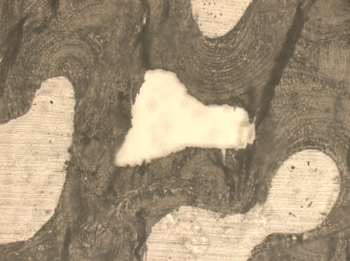Rensselaer Polytechnic Institute researchers have developed a new technology to obtain extensive biochemical data using nanoscale bone samples.
According to the head of the Department of Biomedical Engineering at Rensselaer, Deepak Vashishth who led the research, the study of the bone’s protein signatures using nanoscale bone samples is a simple and quick method to identify the bone’s history, including its formation, quality and proneness to fracture.
 New Method collects extensive biochemical data using nanoscale bone samples
New Method collects extensive biochemical data using nanoscale bone samples
The findings of the study titled ‘Biochemical Characterization of Major Bone-Matrix Proteins Using Nanoscale-Size Bone Samples and Proteomics Methodology’ were reported in the Molecular & Cellular Proteomics journal’s late May issue. The U.S. National Institute of Health funded the study, which was performed in the lab of Rensselaer’s Center for Biotechnology and Interdisciplinary Studies.
Bones are mainly comprised of minerals, with some amount of organic material in which majority amount is collagen. The residual non-collagenous organic material is a blend of other proteins that create an interlinked matrix whose quality differs significantly with disease, nutrition and age.
The researchers studied this bone matrix to find how the changes and interactions of individual proteins affect the strength, structure and development of the whole bone. They used laser-capture microscopy along with numerous other technologies to form a completely new method for studying the bone matrix. They obtained information about the concentration of various proteins in the bone matrix from which the history of the bone can be determined.
Vashishth stated that it is a major breakthrough to improving existing osteoporosis diagnosis methods, which are used to measure loss of bone and the bone quantity with innovative, non-invasive, proteomics-driven technologies for studying the bone quality.